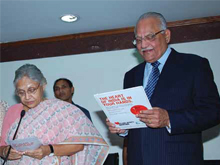Health Topics
-
Healthy Living
-
|
|
February 2011
|
| Billion Hearts Beating |
| The Vision and Urgency Behind the Campaign |
| Dr. I. Sathyamurthy |
| |
 |
The Billion Hearts Beating campaign was launched on 28th April, 2010 by the Apollo Hospitals and the Times of India. The goal here is to make hearts beat regularly and as long as possible. This campaign was initiated to bring awareness among the people regarding the greatest killer epidemic of our country - the heart disease. |
The First Shall Be Last
Coronary Artery Disease (CAD), or the deposition of fat in the blood vessels supplying to the heart, is having an increased prevalence in our country. There are several reasons for this.
- The incidence of diabetes is increasing - and 40 per cent of the sweet ones, ultimately develop heart disease.
- There is ethnic preponderance of Coronary Heart Disease (CHD) in Asians and Indians in particular. Many of them getting affected at a young age, and the progression of this disease is very rapid. As if to compete for early bird prizes, Indians suffer a heart attack 10 years earlier, compared to those from US and Europe!
- The low level of good HDL cholesterol in Indians has been pointed out by studies as a culprit.
- Dietary indiscipline and lack of exerciseare the others caught red handed. In most schools in our country, outdoor games are not part of the curriculum unlike in the West. Hospitals have been observing many young IT professionals come down with heart problems since some time.
Who Needs What?
A long term plan on a war footing is essential to face this epidemic. To achieve this, there should be good co-ordination and co-operation between the population, hospitals, medical professionals and the media.
- In this pyramidal depiction, subjects in 4 and 5 definitely need to rush to hospitals - provided the expertise and latest technology is available in the area. They need tertiary care.
- Subjects in levels 2 and 3 need confirmation of diagnosis, treatment and secondary prevention.
- The bottom of the pyramid is the base segment 1, and the largest. They dwell in an unknown territory. This segment needs to be motivated. They need lifestyle modification, dietary advice, drugs to control risk factors like high BP, diabetes, high blood lipids, etc. to achieve early diagnosis and primary prevention. They also require long term follow-up.
The Plan
- Medical professionals must aim at investigating, treating and following up those cases coming to hospitals with symptoms.
- Those without heart disease coming for annual routine medical check-ups, pre employment check-ups, and those undergoing preoperative evaluation for non- cardiac surgery also need to be investigated and followed up on.
- The general population who don’t express symptoms can be reached by public awareness programmes by the media,public speeches by experts and also by conducting health camps.
- Since super speciality hospitals and expertise is already available in the metropolitan and tier-2 cities, the impetus and maximum motivation need to be shifted to the semi-urban and rural population. These people can be linked to tertiary care hospitals through telemedicine.
- Information technology plays a major role in achieving our goals. The small and medium-sized hospitals, nursing homes and even individual clinics can be linked to tertiary care centres. The Apollo group of hospitals, for example, plans to have a Health Super Highway to link these hospitals.
Partnerships
This mega plan to fight the epidemic of our times is not possible by one individual or organisation. During a war, the whole nation comes together irrespective of caste, creed, religion and region. To fight this epidemic, like-minded organisations should get together. For sustenance of such programmes we need:
- Public-private partnerships: the government with reputed tertiary care hospitals
- Private-private partnership: hospitals with pharmaceutical majors and non-pharma industries
- Partnership with research organisations like Indian Council of Medical Research or Department of Science and Technology, or with non-profitable, non-governmental voluntary organisations like Rotary Clubs, Lions Clubs etc.
To make a music concert successful, responsibility rests not only on the conductor, but on every artiste who should play the right note at a right time with harmony, in the presence of a receptive audience. Like what that old wartime US poster said – “Our country needs you†to enlist. The question is, are you available – to save your own life? |
Dr.I.Sathyamurthy is Interventional Cardiologist and Director, Department of Cardiology at Apollo Hospitals, Chennai (Recipient of Padmashri in 2000 and the Dr.B.C.Roy National Award in 2001)
|
|
|